Related Research Articles

Bhimrao Ramji Ambedkar was an Indian jurist, economist, social reformer and political leader who headed the committee drafting the Constitution of India from the Constituent Assembly debates, served as Law and Justice minister in the first cabinet of Jawaharlal Nehru, and inspired the Dalit Buddhist movement after renouncing Hinduism.

The Neo Buddhist movement is a religious as well as a socio-political movement among Dalits in India which was started by B. R. Ambedkar. It radically re-interpreted Buddhism and created a new school of Buddhism called Navayana. The movement has sought to be a socially and politically engaged form of Buddhism.
Untouchability is a form of social institution that legitimises and enforces practices that are discriminatory, humiliating, exclusionary and exploitative against people belonging to certain social groups. Although comparable forms of discrimination are found all over the world, untouchability involving the caste system is largely unique to South Asia.

Dalit, also previously known as untouchable, is a name for people belonging to the lowest stratum of the castes in India. Dalits were excluded from the four-fold varna system of Hinduism and were seen as forming a fifth varna, also known by the name of Panchama. Dalits now profess various religious beliefs, including Hinduism, Buddhism, Sikhism, Christianity, Islam and various other belief systems. Scheduled Castes is the official term for Dalits as per the Constitution of India.

Anand is the administrative centre of Anand District in the state of Gujarat, India. It is administered by Anand Municipality. It is part of the region known as Charotar, consisting of Anand and Kheda districts.

Mahar, meaning "original inhabitants of Maharashtra", is an Indian caste found largely in the state of Maharashtra and neighbouring areas. Most of the Mahar community followed B. R. Ambedkar in converting to Buddhism in the middle of the 20th century. As of 2017 the Mahar caste was designated as a Scheduled Caste in 16 Indian states.
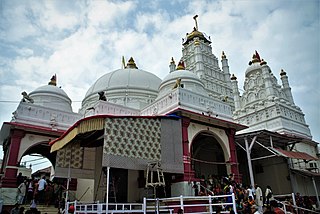
Kheda District is one of the thirty-three districts of Gujarat state in western India. Its central city, Kheda, is the administrative headquarters of the district.
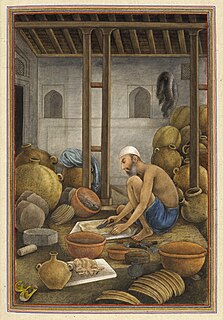
Chamar is a Dalit community classified as a Scheduled Caste under modern India's system of affirmative action. Historically subject to untouchability, they were traditionally outside the Hindu ritual ranking system of castes known as varna. They are found throughout the Indian subcontinent, mainly in the northern states of India and in Pakistan and Nepal.
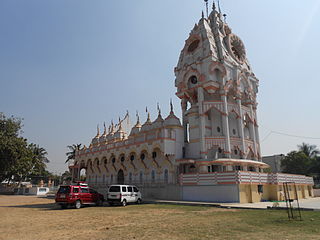
Borsad is a town and a municipality in Anand district in the state of Gujarat, India. It is located around 17 km from Anand. It is surrounded by the fertile Charotar region which largely produces tobacco, bananas, cotton, barley and other agricultural crops. Borsad was the seat of the Borsad satyagraha in 1922–23.
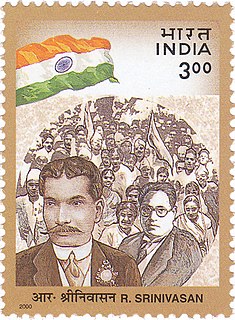
Diwan Bahadur Rettamalai Srinivasan, commonly known as R. Srinivasan, was a Scheduled Caste activist and politician from then Madras Presidency of British India. He is a Paraiyar icon and was a close associate of Mahatma Gandhi and was also an associate of B. R. Ambedkar. He is remembered today as one of the pioneers of the Scheduled caste movement in India. He founded the Adi dravida mahajana sabha in 1893.
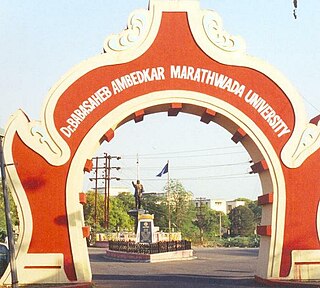
Namantar Andolan was a Dalit and Navayana Buddhist movement to change the name of Marathwada University, in Aurangabad, Maharashtra, India, to Dr. Babasaheb Ambedkar University. It achieved a measure of success in 1994, when the compromise name of Dr. Babasaheb Ambedkar Marathwada University was accepted. The movement was notable for the violence against Dalits and Navayana Buddhists.
Waiting for a Visa is a 20-page autobiographical life story of B. R. Ambedkar written in the period of 1935–36. It consists of reminiscences drawn by Ambedkar, related to his experiences with untouchability, in his own handwriting. The book is used as a textbook in Columbia University.

B. Shyam Sunder was born in Aurangabad district in Bombay Presidency, British India. His father was B. Manicham, a railway employee, his mother Sudha Bai and Manik bai younger sister. He was a political thinker, jurist, prolific writer, parliamentarian and a revolutionary leader. In 1937, he founded the Dalit-Muslim unity movement at Parbhani in Aurangabad, Maharashtra and urged his people to join hands with Muslims. He was a legislator representing Andhra Pradesh and Mysore State.

Eleanor Zelliot was an American writer, professor of Carleton College and specialist on the history of India, Southeast Asia, Vietnam, women of Asia, Untouchables, and social movements.

Kasor is a village in Sojitra Taluka and Anand District, in Gujarat, India. The village has an entrance from the State Highway 83 in Gujarat. Entrance Gate of Kasor came off the highway just after 2.5 km drive. The 400 K.V.SS Power Station is considered as being in this village.
Borsad is one of the 182 Legislative Assembly constituencies of Gujarat state in India.
Petlad is one of the 182 Legislative Assembly constituencies of Gujarat state in India. It is part of Anand district.
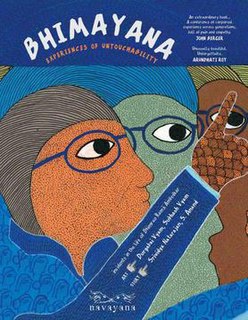
Bhimayana: Incidents in the Life of Bhimrao Ramji Ambedkar is a graphic biography of Bhimrao Ramji Ambedkar published in 2011 by Navayana and was hailed by CNN as being among the top five political comic books. It was created by artists Durgabai Vyam, Subhash Vyam and writers Srividya Natarajan and S. Anand. It depicts the experiences of caste discrimination and resistance that Bhimrao Ambedkar recorded in his autobiographical illustrations, later compiled and edited in Babasaheb Ambedkar: Writings and Speeches by Vasant Moon under the title “Waiting for a Visa”. It is one of India's top selling graphic books.
Gopal Baba Walangkar, also known as Gopal Krishna, is an early example of an activist working to release the untouchable people of India from their historic socio-economic oppression, and is generally considered to be the pioneer of that movement. He developed a racial theory to explain the oppression and also published the monthly journal Vital-Vidhvansak, targeted at the Brahmanical Orthodoxy.

Ambedkarism is called as the teaching, ideology or philosophy of B.R. Ambedkar, an Indian econonist, polymath, barrister, social reformer, human-rights advocate, and the architect of Indian Constitution. Ambedkarism includes the principles of Navayana and liberty, equality and fraternity along with democratic socialism and constitutionalism. An Ambedkarite is one who follows the philosophy of Ambedkar.
References
- ↑ "Anand District Panchayat - My Taluka". Ananddp.gujarat.gov.in. Retrieved 23 March 2019.
- ↑ Ambedkar, Bhimrao (1946). What Congress and Gandhi have done to the untouchables. University of Michigan: Thacker. p. 399. Retrieved 9 February 2015.
Coordinates: 21°30′N74°08′E / 21.500°N 74.133°E